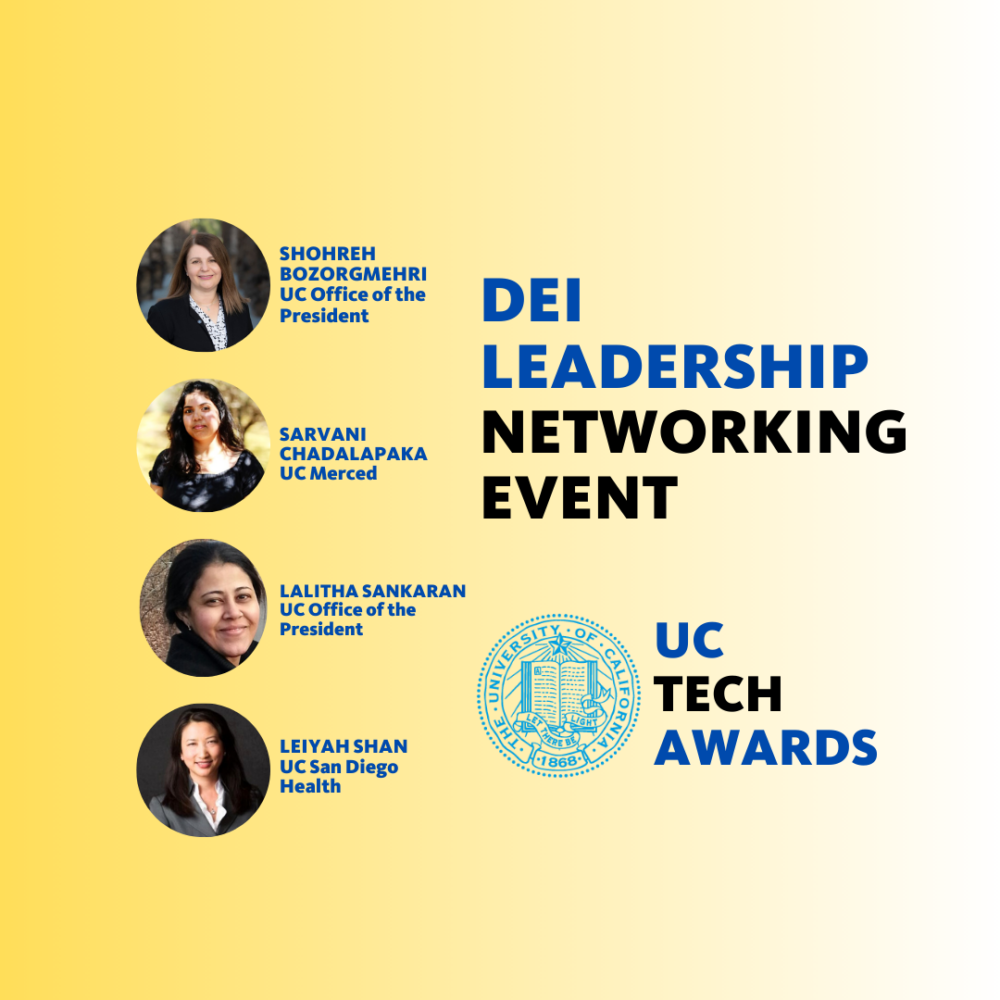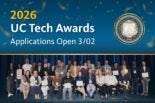The UC Office of the President recently hosted a UC Tech Awards Diversity, Equity and Inclusion (DEI) Leadership networking event on April 17, 2024. Information technology professionals from across the UC system gathered to discuss DEI initiatives with distinguished speakers. The UC Tech News team organized this event to highlight exceptional work in diversity, equity and inclusion (DEI) and to offer real-time networking opportunities beyond conferences. The gathering not only honored the accomplishments of four remarkable women but also encouraged dialogue, introspection, and even new friendships. Each panelist shared the DEI priorities of their individual locations.
The panel included the following distinguished guests:
- Shohreh Bozorgmehri, Interim Chief of Staff to UCOP CIO, received the 2023 UC Tech Awards DEI Leadership golden award.
- Sarvani Chadalapaka, UC Merced, director of Cyberinfrastructure and Research Technologies, received the 2023 UC Tech Awards DEI Leadership silver award.
- Leiyah Shan, UC San Diego Health director of UC San Diego Health Population Health Services Organization, a 2023 UC Tech Awards DEI Leadership award nominee.
- Lalitha Sankaran, UC Office of the President, director of the office of workplace inclusion and belonging.
Shohreh Bozorgmehri’s impact on diversity and inclusion at UC Irvine and beyond
Shohreh Bozorgmehri, Interim Chief of Staff to UCOP CIO, shared her insights into the DEI landscape, highlighting the need to focus on specific issues while ensuring inclusivity across all sectors. She emphasized the ripple effect of DEI efforts, noting how initiatives to increase women’s participation in technology resonate with diverse, marginalized groups.
Prior to joining UCOP, Bozorgmehri alongside of UC Irvine’s esteemed members of Women in Technology Advisory Board led an effort to prioritize using data insights from recent climate surveys to inform strategic action plans for IT careers at UC Irvine.
Bozorgmehri’s current priorities include using data insights from recent climate surveys to inform strategic action plans for IT careers. As the group’s chair, she is dedicated to amplifying the voices of underrepresented individuals and ensuring their concerns are addressed at the highest levels. Bozorgmehri remains committed to fostering larger-scale contributions to equity and inclusion efforts at UC.
Sarvani Chadalapaka, UC Merced, is revolutionizing research computing through diversity and inclusion
Sarvani Chadalapaka emphasized the significance of DEI initiatives in research computing environments at UC Merced, which serves a large population of first-generation students. Recognizing the need to support students in research computing, Chadalapaka highlighted the importance of building a community to help them become comfortable with advanced technology tools like high-performance computing (HPC). By identifying and addressing barriers to entry into the research space, Chadalapaka aims to execute plans that adapt to feedback, fostering stronger inclusivity and accessibility:
“With emerging multifaceted technology disciplines, the user groups of this technology are diverse, but also, these tech professionals have a variety of backgrounds and skill sets. This is essential to move the needle in the technology space. The knowledge is there. However, there is no formula or a fixed path to becoming a tech professional. There is a need to double up on a common language that everyone in the space can use to communicate and solve problems.”
Leiyah Shan’s journey in pioneering ERG in support of DEI in healthcare IT at UC San Diego Health
Leiyah Shan shared her journey as a woman of color director in the healthcare technology industry at the DEI event, highlighting her efforts at UC San Diego Health to address marginalization by initiating an Employee Resource Group (ERG), VIBRANT-IT. This ERG provides a supportive space for women and people of color in tech to discuss challenges and seek solutions. Shan’s ERG focuses on empowering members through training sessions, guest speakers, and discussions on resilience and self-advocacy.
Shan’s work currently focuses on providing under-represented employees with leadership and professional coaching in a safe group setting. She wants to bring mentorship to those employees in a highly accessible and supportive way. She plans to collaborate with other like-minded DEI champions across UCs to augment existing mentorship programs. There is a need for technology departments to have a better understanding of their local talent pool and what are their employees’ career aspirations. It will help level the playing field for under-represented employees to voice their aspirations and receive the mentoring and support needed to chart a path toward success.
Lalitha Sankaran’s EDI Journey: enabling a platform for all voices at the UC Office of the President
Sankaran reflected on her experience growing up in a fairly patriarchal family where her voice did not have a platform. Learning how to give importance to her voice was an intentional and learnt effort. Within the UC Office of the President, Sankaran hopes to provide a platform for all voices, especially those who may not feel valued from marginalized communities. Her leadership style focuses on how EDI efforts are advanced across UCOP emphasizing shared ownership of the work and steadfast leadership.
The audience asked Sankaran the following question.
Question: “EDI, JEDI, DEI, is there a recommended acronym that we should be using today from your perspective?
Answer: Sankaran does not recommend a standard acronym for use in DEI initiatives, as she believes it should be tailored to each organization’s needs. At the UC Office of the President, they changed the acronym from DEI to EDI to emphasize the importance of equity alongside diversity and inclusion. Sankaran suggests that while EDI works well for their organization, other organizations may choose different acronyms based on their unique contexts and priorities.
Key Takeaways
- Campus collaboration: Collaborative efforts are crucial for advancing DEI initiatives on campus.
- Action over acknowledgment: Beyond acknowledgment, actions, or “tangible practices” are necessary to promote DEI in the workplace.
- Top-down support: Support from leadership is essential for creating inclusive environments.
- Continuous Dialogue: Ongoing dialogue is needed to sustain and enhance inclusive practices.
Resources shared
- April 17, 2024, Event slide deck
- March 28, 2024, NEWS: Sarvani Chadalapaka UC Merced: UC Tech Award Program DEI Leadership 2023 silver award winner
- February 29, 2024, NEWS: Shohreh Bozorgmehri, UC Irvine, is the UC Tech 2023 award winner for leadership in diversity, equity and inclusion
- February 8, 2024 INTERVIEW: Creating a vibrant Black at UC community – key takeaways from Van Williams’ fireside chat with Charron Andrus, UC Berkeley
- October 4, 2023 Empowering Women of Color in Healthcare IT: Leiyah Shan’s Journey at UC San Diego Health
- July, 2023 UC Tech 2023 – Diversifying Leadership Development
- April 13, 2023 April is Diversity Month: the story behind the new UC Tech DEI Leadership Award – apply now
- April 5, 2022, UCOP welcomes Lalitha Sankaran as director of the Office of Workplace Inclusion and Belonging
Author

Marketing & Communications Intern
UC Office of the President







